Support for the SNP has fallen in the aftermath of Nicola Sturgeon’s resignation as first minister and the ongoing police investigation into the party’s finances, according to a poll published on Wednesday.
Ipsos’ Scottish Political Monitor, run in partnership with STV News, found the SNP remains the dominant party in Scotland, but the support it would receive at a UK general election has fallen by ten percentage points over the last six months.
Based on a representative sample of 1,090 adults questioned between May 15 and May 21, the poll showed the SNP would receive 41% of the vote in an immediate Westminster election – ten points lower compared with the December 2022 Ipsos poll and four points lower than the 45% who voted for them at the last UK general election in December 2019.
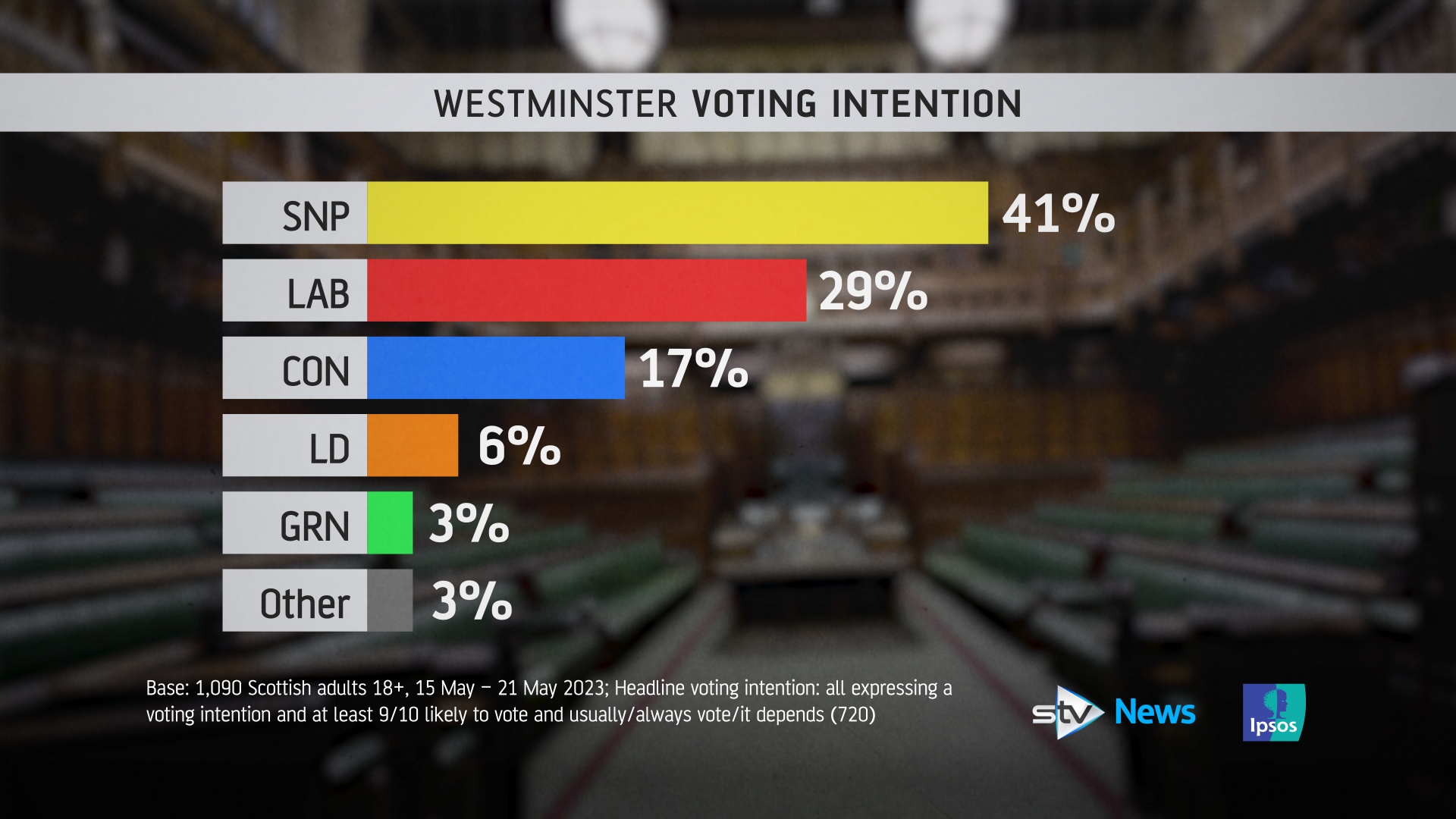 STV News
STV NewsSupport for both Labour and the Conservatives has increased slightly compared with Ipsos’ previous poll in December 2022.
Labour are in second place on 29% (ten points higher than the 19% of the vote they achieved in 2019), while the Conservatives are in third place on 17% (which, while a small improvement since last December, is still eight points down on the 25% share of the vote they took in 2019).
Based on Ipsos’ sample, the SNP are projected to win 44 seats at the next UK general election. Scottish Labour would take nine seats, while the Scottish Conservatives and the Scottish Liberal Democrats would each win three seats in the House of Commons.
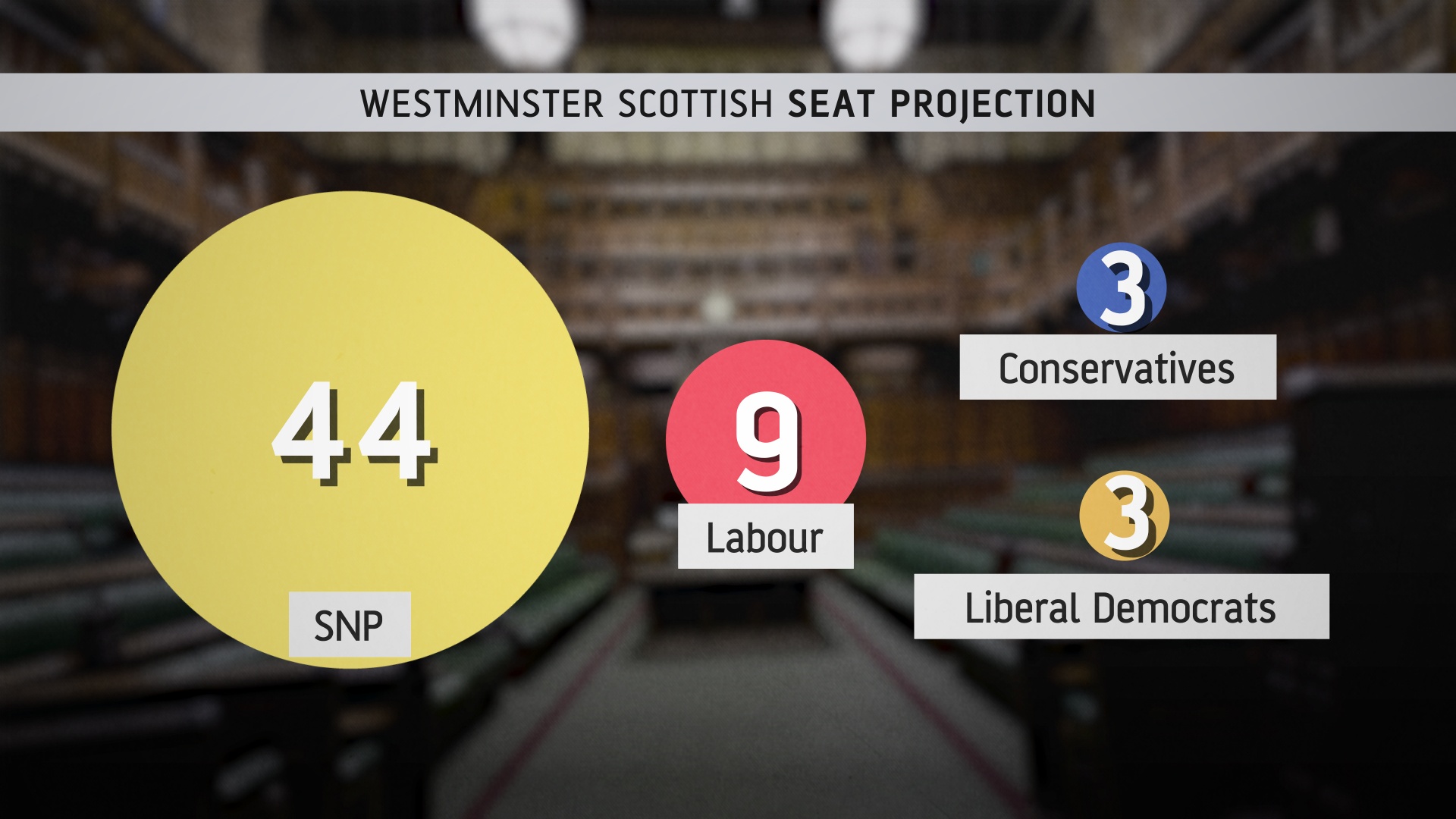 STV News
STV NewsThe poll comes after a tumultuous few months for the SNP, with a fractious leadership debate having concluded less than two months ago and the ongoing police probe over the party’s finances – which has seen the arrest of former chief executive and Sturgeon’s husband Peter Murrell and then-party treasurer Colin Beattie.
They were both released without charge pending further investigation.
Emily Gray, managing director of Ipsos in Scotland, said: “In the wake of Nicola Sturgeon’s unexpected resignation, a divisive leadership contest and controversy over the party’s funding and finances, support for the SNP has fallen back.
“With First Minister Humza Yousaf’s approval ratings weaker than Nicola Sturgeon’s were, it may be challenging for the party to regain that support. Meanwhile, Labour will be hoping that the indication in this poll of a weakening relationship between past independence support and voting for the SNP becomes a trend on which they can capitalise.”
Independence
Support for Scottish independence has also dipped since the last Ipsos poll in December 2022, although by a smaller margin of three percentage points.
The poll still finds a small lead for Yes overall. Among those with a voting intention and very likely to vote, 53% said they would vote Yes in an immediate referendum, while 47% said they would vote No.
In recent years, support for independence has been very closely correlated with electoral support for the SNP.
But there are signs that more 2014 Yes voters are beginning to consider voting for parties other than the SNP.
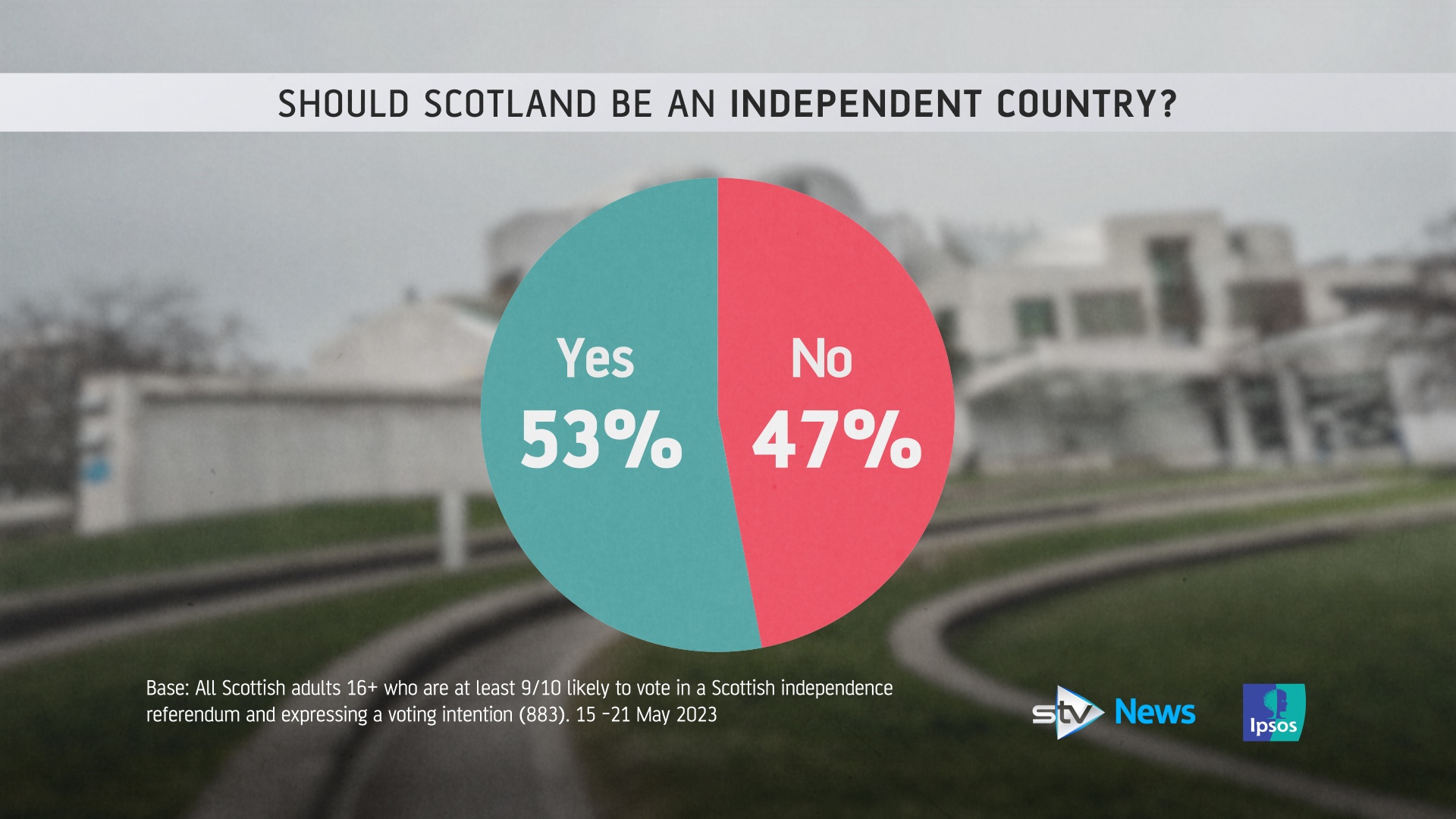 STV News
STV NewsThe Ipsos poll also found the close relationship in recent years between past support for independence and support for the SNP may be weakening.
While 69% of 2014 Yes voters said they would vote for the SNP at an immediate general election, that is a fall of 12 percentage points compared with a year ago.
Labour may be well placed to benefit; their support among 2014 Yes voters has increased by nine percentage points compared with a year ago, to 15%.
Key issues
The top five key issues concerning for the Scottish public are:
• Healthcare/NHS (41% mention this as an important issue facing Scotland, unchanged since December 2022)
• Inflation/the rising cost of living (29% mention this as an important issue facing Scotland, similar to the 28% who mentioned it in December 2022)
• Education and schools (28%, up five percentage points since December)
• The economy (25%, up four percentage points since December)
• Scottish independence/ devolution (25%, up two percentage points since December).
Leaders
Anas Sarwar is the only political leader asked about in the poll to receive a positive net satisfaction rating – 40% are satisfied with his performance as Scottish Labour leader, while 33% are dissatisfied.
However, 27% don’t know enough to rate him.
Humza Yousaf’s ratings are more negative –35% are satisfied with his performance as First Minister, while 44% are dissatisfied, giving a net satisfaction rating of -9.
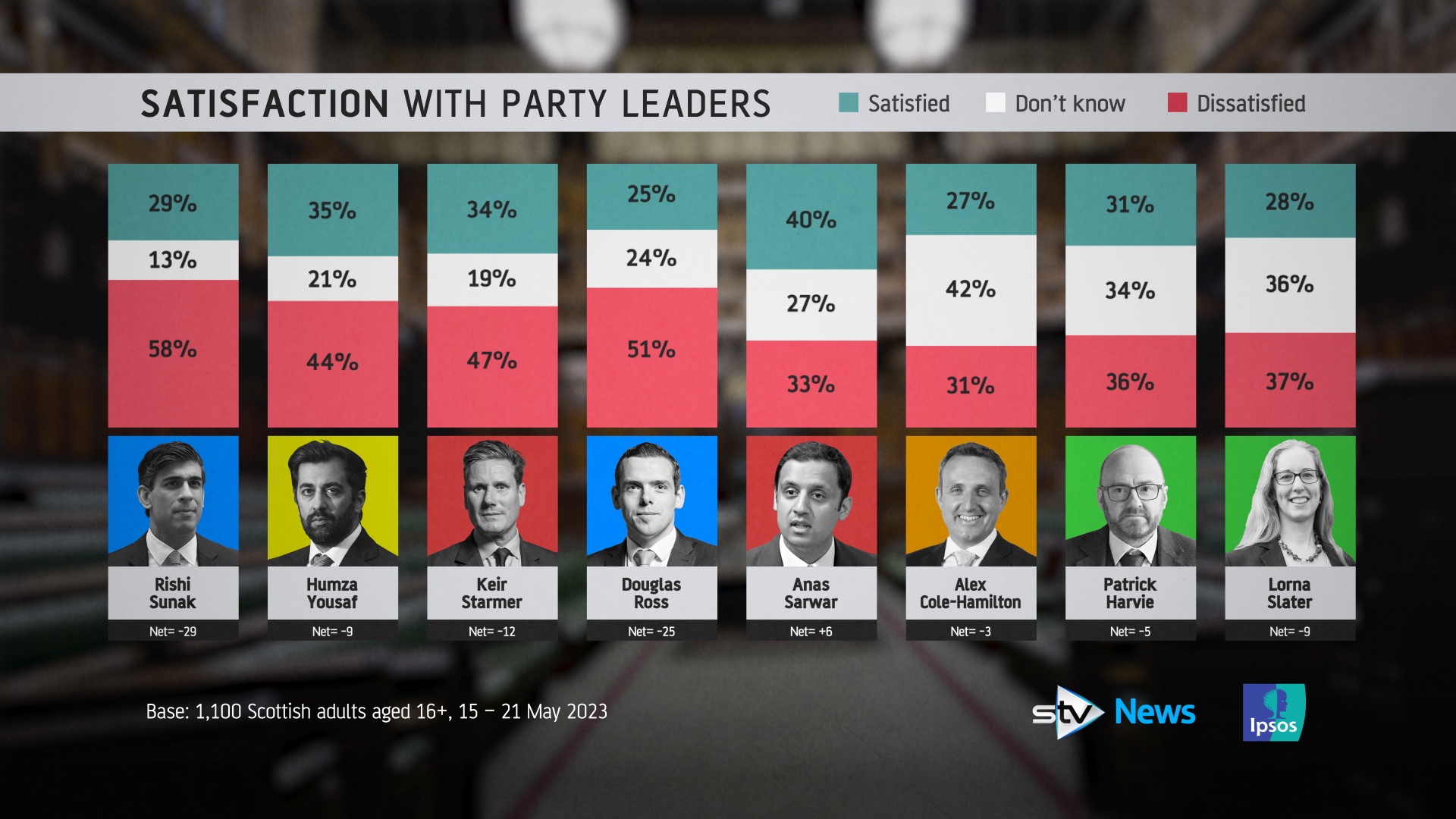 STV News
STV NewsThis contrasts with the +9 positive rating for his predecessor Nicola Sturgeon in the December 2022 poll.
Scottish Conservative leader Douglas Ross receives a negative net satisfaction rating of -25, which while low is an improvement on his previous rating of -38 last December.
In contrast, dissatisfaction with Rishi Sunak has increased compared with six months ago. He receives a negative net satisfaction rating from Scots, of -29, with 29% satisfied and 58% dissatisfied with his performance as Prime Minister.
Dissatisfaction with Keir Starmer remains at a similar level to December 2022 – 34% are satisfied with his performance as leader of the UK Labour Party, while 47% are dissatisfied, giving a net satisfaction rating of -12 now compared with -13 in December.
Gender
Half of Scots (51%) say that the Scottish Government should not be going to court to challenge the UK Government’s decision to block the Gender Recognition Reform Bill, while 39% say it should be doing so.
A majority (57%) of those who voted SNP at the 2021 Holyrood election think that the Scottish Government should be challenging the UK Government’s decision in court.
However, the divisiveness of this issue for the SNP’s own voters is underlined by the finding that a significant minority – 36% – of SNP voters say that the Scottish Government should not be going to court to challenge the UK Government’s decision.
YouGov research forecasts heavy SNP seat losses
The Ipsos poll comes on the same day as analysis by pollsters YouGov suggested Labour could gain almost two dozen seats from the SNP in Scotland if a UK general election were to be held tomorrow.
Their analysis projects the SNP could capture the seat currently held by Scottish Conservative leader Douglas Ross, but also indicated 23 seats currently held by the SNP could fall to Labour, including that of deputy Westminster leader Mhairi Black.
While the SNP won 48 seats in Scotland at the last general election in 2019, YouGov’s research showed that could fall to 27, with the party losing 23 seats to Labour, mainly across central Scotland.
Noting Sir Keir Starmer’s party may well need to make gains in Scotland if he is to become the next prime minister, Patrick English of YouGov said the findings would provide “strong encouragement to Labour”.
The YouGov research, which used MRP (multi-level regression and post-stratification) statistical techniques to forecast the result of the next Westminster election in Scotland, suggested the SNP could gain Moray – where Ross is stepping down at the next general election – and the West Aberdeenshire and Kincardine seat of UK energy minster Andrew Bowie from the Conservatives.
But overall, YouGov projected the SNP to have its worst general election results since 2010.
The findings indicated Yousaf’s party could lose six of the seven Glasgow constituencies it currently holds – with Glasgow Central, Glasgow East, Glasgow North, Glasgow North East, Glasgow North West and Glasgow South all projected as gains for Labour.
Overall, Labour’s tally of seats in Scotland is projected to increase from just one at present to 24, according to the research which involved more than 3,500 voters north of the border.
YouGov said it based its research on fieldwork carried out between April 10 and May 21 – after Yousaf took over as SNP leader and First Minister, and after a police investigation into SNP finances resulted in both the party’s HQ in Edinburgh and the home of Sturgeon being searched.
Follow STV News on WhatsApp
Scan the QR code on your mobile device for all the latest news from around the country


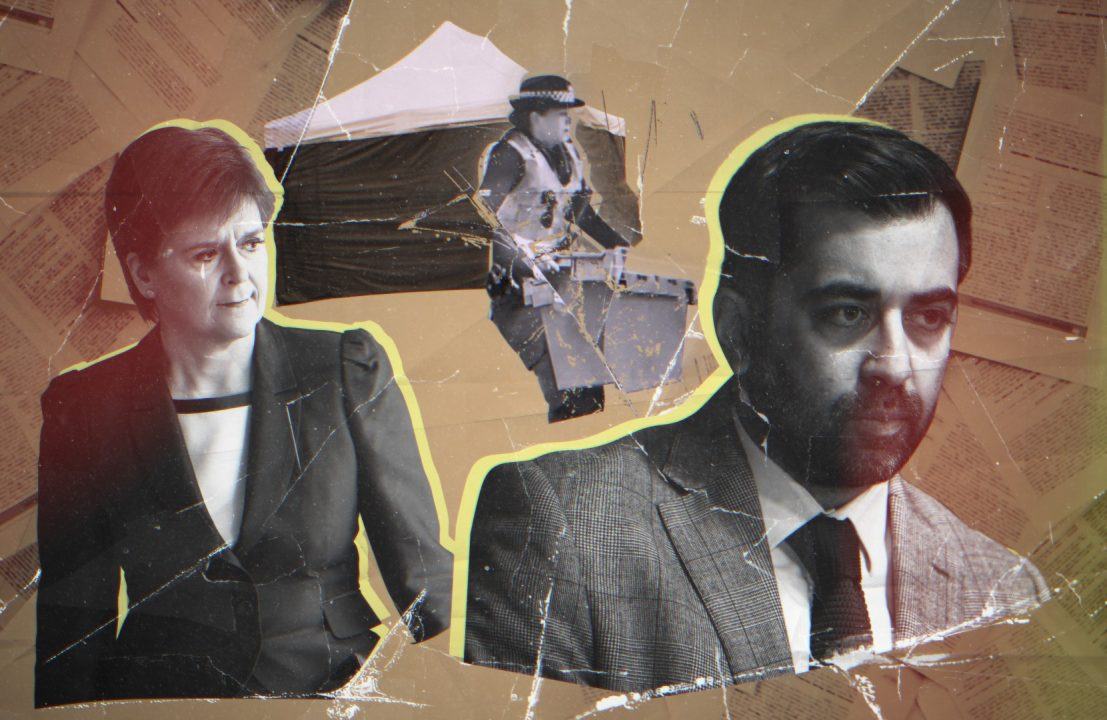 STV News
STV News

























